No Survival Benefit With NAC for Advanced Stomach Cancer
The study covered in this summary was published on medrxiv.org as a preprint and has not yet been peer reviewed.
Key Takeaway
Neoadjuvant chemotherapy (NAC) did not improve survival in older adult patients undergoing gastrectomy for advanced gastric cancer.
Why This Matters
There is broad consensus that neoadjuvant chemotherapy improves survival in late-stage gastric cancer, but the issue has not been well studied in patients older than age 75 years.
The small review suggests that there is no survival benefit in older adult patients.
Investigators called for a well-controlled trial to conclusively address the issue.
Study Design
The team compared outcomes in 15 patients who underwent preoperative NAC with 64 patients who had direct surgery.
Patients had locally advanced cT4a, cT4b, or cN3 gastric cancer.
The median age was 77 years in the NAC group and 79 years in the direct surgery group.
Median follow-up was 34 months.
NAC patients generally had three cycles of chemotherapy at 80% of the standard dose in the 2 months leading up to surgery. SOX (S-1, oxaliplatin) was the most common regimen.
Significantly more patients in the NAC group had total gastrostomies.
Key Results
Two-year overall survival was 53.3% in the NAC group vs 70.3% with direct surgery.
Median survival was 37 months with NAC but not reached in the direct surgery arm (P =.294).
There were no statistical between-group differences in postoperative complications or hospital length of stay.
Limitations
It was a small, retrospective study.
It is not known why some patients were selected for NAC and others not.
Poorer survival in the NAC group may have been related to the higher incidence of total gastrectomy.
Disclosures
The work was funded by the National Natural Science Foundation of China.
The investigators reported no relevant financial relationships.
This is a summary of a preprint research study, “Neoadjuvant Chemotherapy plus Surgery versus Direct Surgery in Senile Patients with Gastric Cancer,” led by Birendra Kumar Sah of Shanghai Jiao Tong University, China, provided to you by Medscape. The study has not been peer reviewed. The full text can be found at medrxiv.org.
M. Alexander Otto is a physician assistant with a master’s degree in medical science and a journalism degree from Newhouse. He is an award-winning medical journalist who has worked for several major news outlets before joining Medscape and also an MIT Knight Science Journalism fellow. Email: [email protected].
For more from Medscape Oncology, join us on Twitter and Facebook
Source: Read Full Article
